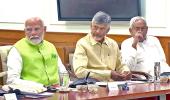'There is also a possibility that Andhra Pradesh may demand a similar package. But as of now, we are only working on a package for Bihar.'

The Union finance ministry is likely to prepare a Bihar package, which includes a possible special status for the state, for the next National Democratic Alliance meeting later this week, a source aware of the developments said.
The ministry's key concern is the impact of this package on the projected fiscal deficit for FY25.
It is looking to keep all elements of the package within Rs 1 trillion but spread over more than one year.
Another crucial question before the ministry is which types of central schemes can be incorporated into the special status, given the abolition of the Plan and Non-Plan dichotomy in the central government's Budget.
"There is also a possibility that Andhra Pradesh may demand a similar package," the source said. "But as of now, we are only working on a package for Bihar."
The Union Budget, slated for early July, could potentially introduce another package for Andhra Pradesh, the source said.
The finance ministry did not respond to an e-mail regarding this development from Business Standard until going to press.

In a race against time, old formulae like the Mukherjee-Gadgil formula for allocating planned funds among state governments are being revisited to shape the package.
Leaders of both Bihar, under its Chief Minister and Janata Dal-United President Nitish Kumar, and Andhra Pradesh, including YSR Congress chief Jagan Mohan Reddy and TDP President N Chandrababu Naidu, have requested special economic packages for their states, citing their relative backwardness compared to other states.
In 2015, Prime Minister Narendra D Modi announced a Rs 1.25 trillion package in central funds for Bihar, spread mostly across the education, health, energy, and road sectors. However, there was no mention of a special status for Bihar.
The BJP anticipates that Kumar will demand a restructuring of both core schemes and centrally sponsored schemes to include a Bihar element permanently.
Officials acknowledge the challenge, as the financial structure of all schemes has changed since 2015.
Previously, special status meant that 90 per cent of the Plan allocation was provided by the Centre, offered only to the North East states and then relatively new states of Jharkhand, Chhattisgarh and Uttarakhand.
Now, funds for the Core schemes -- like the Mahatma Gandhi National Rural Employment Guarantee Act and Sarva Shiksha Abhiyan -- are spent across state boundaries, often without reference to the state treasuries.
Other schemes are also not often state-specific. The role of the NITI Aayog in the disbursement of funds has diminished. In 2015, the Union government also announced a Rs 80,000 crore (Rs 800 billion) package for the then Jammu and Kashmir government.
The ministry, it has been learnt, is addressing the challenge systematically. In the first phase, the overall contours of the package shall be finalised and adopted.
The financial detailing, such as opening of the central schemes and changing their operational route, will be done subsequently.
Feature Presentation: Ashish Narsale/Rediff.com











